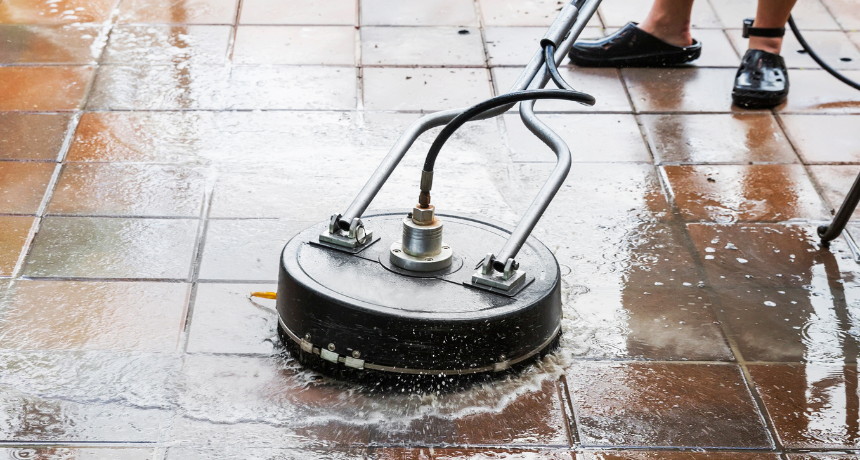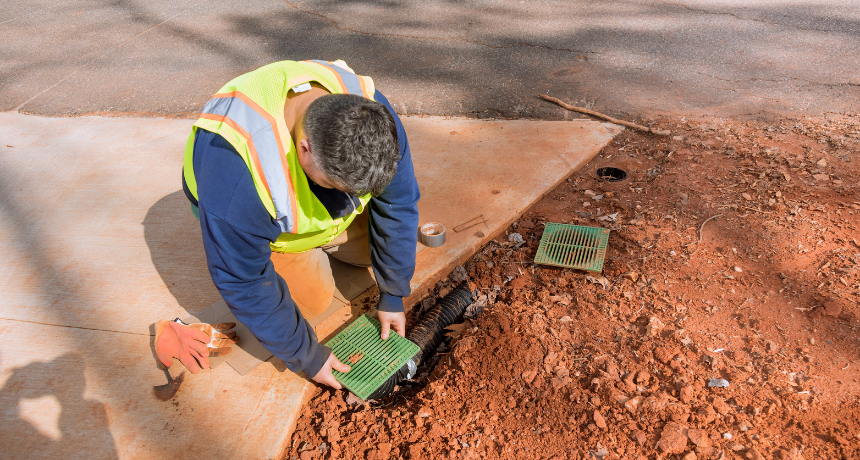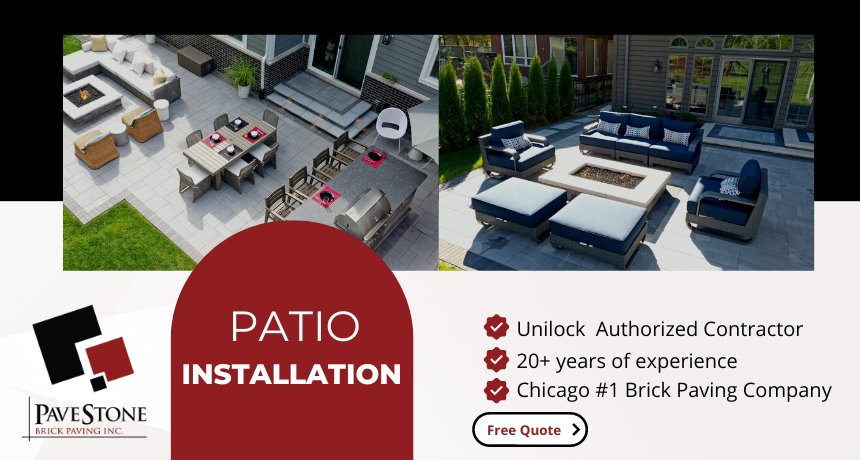Proper drainage is necessary to enjoy a backyard patio optimally. Poor drainage can lead to a host of unwanted issues, including mold growth, stains, and slip hazards. Preventing water from pooling on the patio surface can be achieved via the following methods.
Rain nourishes green lawns and plants. However, rainwater collecting on the patio is a nuisance that spoils the outdoor fun of homeowners and their families. Since the Midwest receives 20 to 47 inches of rain annually, it’s necessary to learn how to prevent moisture from pooling on the patio.

What problems does pooling water create?
Rainwater lingering for prolonged periods on the patio surface is only the start of potential problems. As mentioned, mold and mildew can grow in the moist environment. A wet patio creates slippery surfaces, making it dangerous to small children and the elderly.
Furthermore, a consistently damp patio is costly for homeowners. Maintenance issues, such as mold removal, cleaning, and repairs, are expensive to fix. Persistent moisture can also damage patio materials. Lastly, if the water pools next to the home, it can seep into the basement.
Why does water pool on the patio?
Patio drainage problems can be caused by any number of common scenarios. A completely flat patio with various low spots where water collects can be responsible for pooling water. An improper slope fails to allow the rainwater to run off the surface.
Patios may drain well initially—but after a period of time the drainage system can become clogged with natural debris. Homeowners who notice that rainwater collects on the surface instead of draining may be faced with a clogged drainage system.
Improperly directed downspouts can send significant amounts of rainwater onto the patio, leading to pooling. This is especially the case when the rainwater flows directly onto the patio from the downspout or roof overhang. Redirecting the downspouts away from the patio is an easy fix.
How do homeowners prevent water from pooling on the patio?
1. Install a Drainage System
If the existing concrete patio lacks a drainage system, it is a practical move to install one. In areas where the rainwater collects, cut a sloping channel. A well-cut channel directs the water away from the patio. Fill the channel with decorative stones or gravel so it meets aesthetic ideals.
An alternative to gravel is installing a metal channel drain. Built to be a few inches wide, the channel drain permits the free flow of water without accumulating debris. These trenches or drains are installed flush with the patio to prevent tripping hazards.

2. Overlay the Patio
Water collects in puddles without a sloped finish. Homeowners can remedy this problem by installing a cement-based overlay. The pitch of the patio is corrected with an overlay that ranges from four inches down to an inch. It’s installed in sections to minimize the need for sawcuts.
3. Drill Drainage Holes
A simple solution to patio drainage problems is to drill small holes in the surface. Holes approximately three centimeters in diameter allow excess water to drain and prevent issues with standing water. Fill the holes with gravel for a pleasing appearance.
4. Change the Direction of Downspouts
The gutter system along the rooftop may direct large amounts of rainwater onto the patio, causing unwanted pooling. When the gutter is responsible for the issue, change the direction of the downspouts so that they redirect water away from the patio.
5. Maintain the Drains
A blocked drainage system is unable to do its job of draining excess rainwater away. Due to this reason, maintaining the drainage system is key to preventing future water buildup. Clean blocked drains immediately and adjust inefficient drains so that they adequately facilitate drainage.
6. Install an In-Slab Drainage System
This option is recommended when installing a new patio on a landscape that does not allow natural water runoff. A concrete contractor can install an in-slab drainage system built with trenches or channels that carry the excess rainwater away from the patio.
7. Use Permeable Concrete Pavers
When building a new patio, consider using permeable or porous concrete pavers to prevent water from pooling. The pavers allow water to percolate through the surface of the patio and into the ground below. This strategy reduces the amount of stormwater runoff and benefits the surrounding landscape.
8. Opt for a Resin Bound Patio Surface
Resin bound patio surfaces are ideal for new constructions, as they are porous and comply with sustainable drainage systems. Due to these reasons, plus the fact that resin is a highly versatile material, they are frequently used in garden pathways, play parks, and residential patios.
Don’t let rainwater pooling on the patio ruin your family’s time outdoors. Use any of the abovementioned tactics to prevent standing water on your outdoor living space. If you are installing a brand-new patio and are considering brick pavers, choose Pavestone Brick Paving, Inc.

We are a well-rated patio contractor experienced in bringing homeowners’ visions to vivid life. A functional, beautiful patio starts with a clear design. You choose your preferred look for the pavers and we incorporate the practical elements to prevent pooling water and other structural issues.
Pavestone Brick Paving, Inc, offers a variety of materials to build a patio you thoroughly enjoy. Natural stone slabs are durable, versatile, and cost-effective. Interlocking brick pavers are alternate options that resist dirt, weathering, and stains. Choose from cobblestone and traditional brick, among others.
If your patio is already built, our team can help you maintain it or repair issues, including water pooling on the surface. Specialists are available for re-leveling, re-setting, and repair. We can also sealcoat the patio and power wash it to restore its color and lustrous appearance.
Homeowners in Des Plaines, Illinois, and the northwestern Chicago suburbs, choose the best to install, repair and maintain their patio. Pavestone Brick Paving, Inc, invites you to do the same. Whether you envision a brick patio installation or prefer natural stone, give our experienced team call at 847-895-7004.














